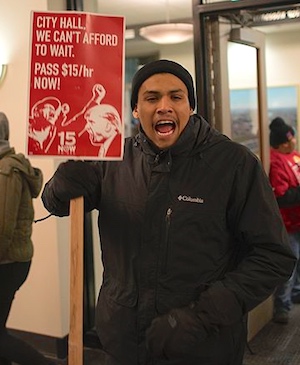By David Flemming
We can add a possible tax increase to the list of reasons not to adopt a $15 minimum wage.
At the fourth and penultimate meeting of Vermont’s Minimum Wage Study Committee on Oct. 30, Rep. Helen Head, D-South Burlington, raised again the concern that employees who receive a raise could find themselves disqualified from receiving certain government benefits. In many cases, the loss of benefits would outweigh the increase in salary, creating a disincentive to work.
 This dynamic is particularly acute when it comes to child care, as highlighted by the Childcare Financial Assistance Program, under which “each of the households would see a cumulative loss of benefits … an increase in wages would decrease the family’s child care benefit more than the amount gained by the wage increase, resulting in a net financial loss for the family.” Therefore, a $1 increase in income would often result in a loss in childcare benefits that exceeded $1.
This dynamic is particularly acute when it comes to child care, as highlighted by the Childcare Financial Assistance Program, under which “each of the households would see a cumulative loss of benefits … an increase in wages would decrease the family’s child care benefit more than the amount gained by the wage increase, resulting in a net financial loss for the family.” Therefore, a $1 increase in income would often result in a loss in childcare benefits that exceeded $1.
The “solution” outlined in the report, increasing the threshold for benefits to negate harm, “would cost between $4.8 and $12.8 million annually.” This of course, would have to be funded by a reduction in spending in other parts of government (not likely!). Or, likely, an increase in taxes to cover those costs.
Also of note from the meeting, each of the six legislators acknowledged that Vermont would be facing some job losses with a minimum wage increase to $15/hour. How much the legislators care runs a wide gamut. Sen. Brian Callomore, R-Rutland, sees any loss of jobs as unacceptable, stating, “Our local businesses are in a fragile state … should family leave pass, it would be a double whammy. I’m in favor of the current statute (of a minimum wage that increases with inflation).”
On the other side of the spectrum, Sen. Michael Sirotkin, D-Chittenden, sees job losses as an acceptable cost of addressing “the most important driver of this discussion, [which] is wage inequality.” (Though it’s hard to reconcile the math behind some people getting a raise and other’s getting fired so that their wages go to zero, being a solution to “wage inequality.” Math would indicate this dynamic would increase rather than alleviate the problem.)
So, as we head into the fifth and final meeting of this committee before they make their recommendation to the full legislature, we’re looking at a policy that will certainly cost thousands of low-income Vermonters their jobs, will increase the cost of goods and services, put our businesses as a historically severe competitive disadvantage with New Hampshire, and could require a $12.8 million tax increase to smooth out the rough edges.
What part of this makes sense?
David Flemming is a policy analyst for the Ethan Allen Institute. Reprinted with permission from the Ethan Allen Institute Blog.



“Wage Inequality”, a rallying cry for the sjw agenda. Like most others, it’s declaring war on a basic reality, like gravity. Good luck making it happen!
So, when everybody gets paid the same for everything they do, or don’t do, we will all be equal, and paradise on earth will return.
Please send a postcard when you get there!
Did they use common core math to do their calculations?
You only get $15/hr if you still have a job.
All of it, if your a lib!!!